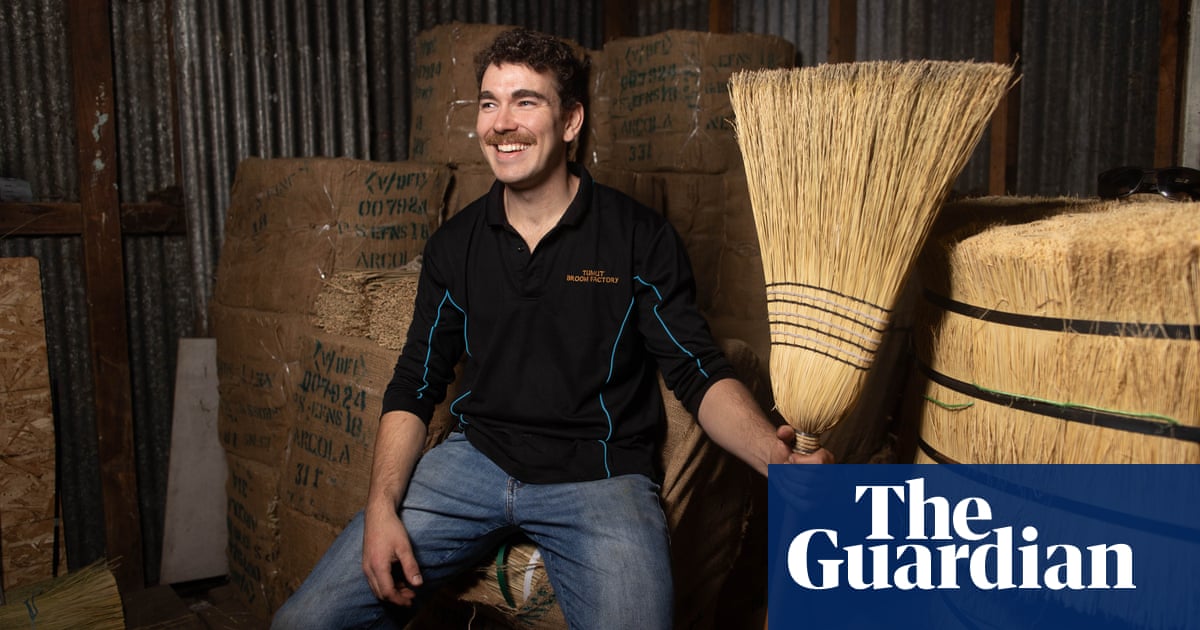In a warehouse just off the Snowy Mountains highway, in the foothills of Mount Kosciuszko, the sweet smell of millet fills the air. There is the soft hiss from a pneumatic sewing machine and the interested chattering of tourists. They have come to watch brooms being made.
The Tumut Broom Factory has been handcrafting millet brooms since 1946, supplying long-lasting brooms to wholesalers and visitors who travel down the winding roads.
One couple, from Brisbane, says the factory was on their “must visit” list on a trip around the country. Others have made the relatively short if circuitous trip from Canberra, and another family has travelled up from regional Victoria.
“People love watching people make things,” says third generation broom maker Andrew Wortes. “They’re amazed that they can walk into a factory and watch people make something, like brooms, or blacksmiths and visit lost trade fairs across Australia.”
Wortes, 28, studied music in Melbourne, but moved home to the town of 6,000 in 2019, just before the pandemic put a dampener on the live music scene.
“I grew up around it and used to come in and help Dad cut the strings off and finish the brooms,” he says. “But there’s only so much you can learn until you actually have to make a broom.”
He now owns the factory, having bought out his father, Geoff Wortes, and business partner, Rob Richards, in 2022.
“Dad wanted me to do other things,” he says. “I was in bands and went off and studied at university, but when I decided to come back, Dad said, ‘you’ll know what you’ll be doing if you move back to Tumut’, and I said, ‘yeah, Dad, I want to learn’.”
It takes six months to learn how to make a decent broom, Wortes says. Now, with four years’ experience, he can make about 20 on his own each day. Broom-making is juggled between welcoming visitors, handling wholesale orders and managing the business.
“There were a lot of learning curves, it’s not just broom-making,” Wortes says. “There’s the sewing, working on the machines … They’re all a unique kind of machinery that takes its own set of knowledge and skills. You can’t just call up someone to come and fix it.”
‘People appreciate that it’s made in Australia’
The majority of millet used in the factory is imported from the US, after being grown in Mexico. Sorghum vulgare, known as broom corn or broom millet, grows best in soils consistently at or above 20C and must be harvested by hand to be used in broom making, preserving the ‘tassels’ at the head of the plant.
“You get good years and bad years with local millet. It’s a lot more consistent out of America,” Wortes says.
The imports are pre-graded and packed, removing the need to utilise the ancient grading machine in the back of the warehouse. That machine is reserved for local crops. (It was recently put to use to sort out the best millet for a broom with the black and gold colours of the Gundagai Tigers rugby league club, for a mate.)
The Tumut broom millet industry is a shadow of what it used to be, but Wortes says he would like to see momentum build again. He has begun speaking to growers in Tumut about growing millet.
after newsletter promotion
“If we’re ever going to build the industry up back, the main issue is going to be the labour component,” he says. “You need a team of people who can cut the millet by hand. It’s mainly the harvesting that takes manpower.”
While the mainstay customers of the factory are rural farming families who have grown up with a woolshed broom, seven-tie broom and caravan broom all from the one factory, Wortes says there is increasing demand from city customers for an authentic, locally grown and made product.
“People really appreciate, especially in the past five years, that it’s made in Australia,” he says. “Even though we do import the millet, we’re still making the brooms here, the handles are Australian timber.
“During Covid it became very apparent how much we’re relying on other countries for our goods and services, and I think that’s why people want to see Australian-made make a comeback.”
It is quiet in the factory between tours and passing trucks. The skylights on the roof were filled in years ago, leaving the huge double doors to let in most of the light. Most days, as Wortes prepares to shut the shop for lunch, he uses the lull to take advantage of the vaulted ceilings and play some Bon Iver. The music career is never far behind.
“This place has really good acoustics, I’ve put speakers in here before just to hear the space and it could be a really good live venue in here,” he says.
With the music playing and the warm light filtering through, he can think about the history of the place.
“I want to make brooms because it is traditional,” he says. “I didn’t want to see it disappear and become one of those trades that people stopped doing.”











